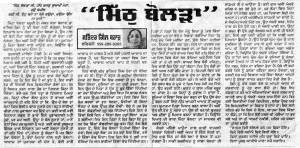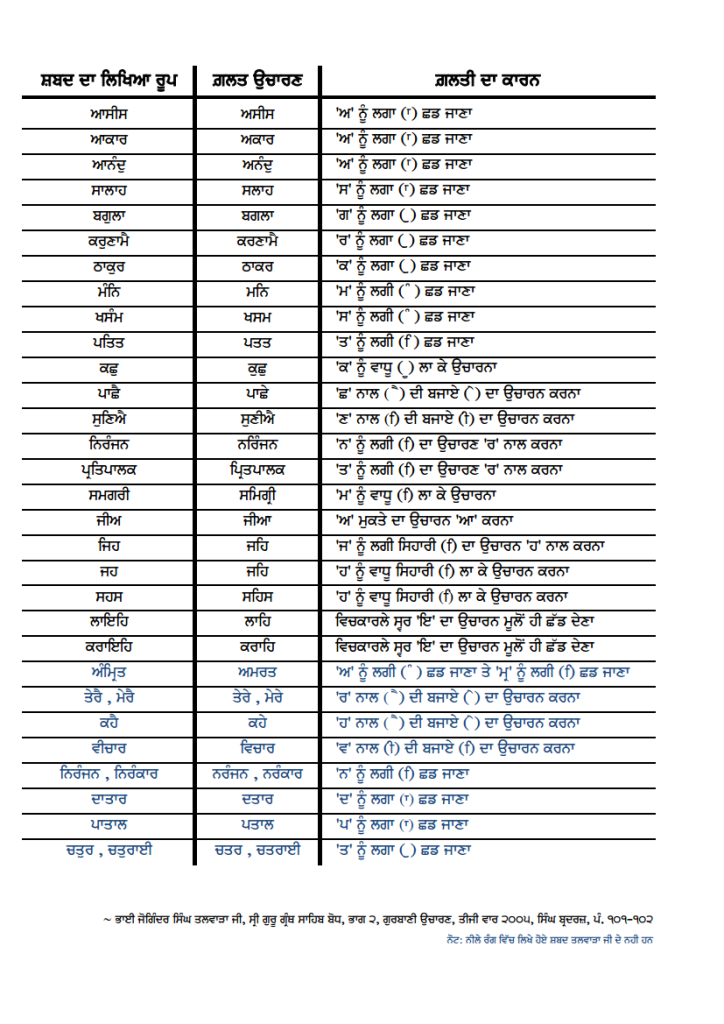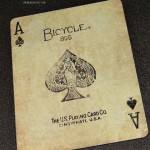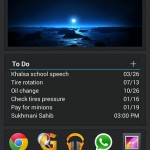Hold up.. what should you do while reading Gurbani?
Vaheguroo Ji Ka Khalsa Vaheguroo Ji Ki Fateh
Today, I’d like to take a moment to pause and reflect on an important topic: Pausing.
In Gurbani, we don’t have any commas. However, that doesn’t mean that every line is just read continuously. On the contrary, there are inherent pauses in each line and we ourselves have to know when to pause while reading. Correct bisraams (pauses) help to convey the right meaning, while an incorrect bisraam can completely change the meaning of the tuk(line). Most of the time the pause is intuitive and we can naturally tell where it is as we read. Other times we have to make a conscious effort to figure it out and understand. This is important because a slight difference in bisraam can convey a message completely opposite to a line’s actual meaning.
For the sake of getting this point across – Here are some examples where incorrect placement/pronunciation of a comma can completely change the intended meaning.
English example:
- “Woman, without her, man is worthless.”
- “Woman, without her man, is worthless.”
Two entirely different meanings conveyed just by changing the comma placement (Bisraam)!
Punjabi example:
- ਰੋਕੋ ਨਾ, ਜਾਣ ਦਿਓ। “Roko na, Jaan deo” – Don’t stop them, let them go.
- ਰੋਕੋ, ਨਾ ਜਾਣ ਦਿਓ. “Roko, na Jaan deo” – Stop them, don’t let them go.
Example from Gurbani (commas added for illustration):
ਗੁਰੁ ਅਰਜੁਨੁ, ਘਰਿ ਗੁਰ ਰਾਮਦਾਸ, ਭਗਤ ਉਤਰਿ ਆਯਉ ||੧|| ( ਅੰਗ ੧੪੦੭)
In the House of Guru Raam Daas, the devotee of the Lord, Guru Arjun was born. ||1||
If we put the bisraam after ghar and say “Gur Arjun Ghar, Gur Raam Daas..” it would mean that Guru Raam Daas ji was born into the house of Guru Arjun Dev Ji, which doesn’t make any sense!
So how do we know where the bisraam is? Usually our doubts can be cleared by stopping and doing vichar on the meanings of the lines or reading some steeks/meanings. Sometimes it is not clear or there are conflicting translations. We can rely on research and translations of previous Gursikhs and the context of the shabad to try our best to understand where the pause is. Typically there we can tell if the meaning is contrary to Gurmat and therefore not likely. We may not always be correct, because our understanding is limited and Gurbani is above and beyond our intellect. However, we should still make our best effort.
This is especially important for Keertanis – they should create and adjust their tunes based on the Shabad, rather than fit the Shabad to the tune. Unfortunately most of us do the latter, often without realizing it. Even if it doesn’t make a huge difference to the meaning, it is still important because we are supposed to be using music as a tool to bring out the mood and meaning of a particular pangti (line). Some times we sing a line for the first time on stage, without knowing the correct pauses and just separate it according to the tune or taal. Ideally we should have read and understood the shabad before singing it. Fortunately, knowledgeable Gursikhs will often correct us so that we can sing it properly.
The following is a list of some common bisraam mistakes that people usually make because they aren’t often discussed or are easily overlooked. Some of these I have observed during kirtan or paath, while others I have learnt from my father or other Gursikhs. I have added spaces in the lines to signify where a pause “should” be.
ਗਾਵੈ ਕੋ ਜੀਅ ਲੈ ਫਿਰਿ ਦੇਹ || (ਅੰਗ ੧)
Some sing that He takes life away, and then again restores it.
If we put the bisraam after jeea, or the third word in every line of this pauri, as is commonly done, we would say “some sing of life, takes then gives.” Clearly “take” goes with “life”, so they should be together as one phrase. It should be “Gaavai Ko, Jee Lai Phir De”. Most of the lines in this pauri have the bisraam after “Ko”. (ex: Gavai Ko, Gun Vadiaayeea Char. Gaavai Ko, Vidhia Vikham Veechar)
ਚਰਨ ਸਤਿ ਸਤਿ ਪਰਸਨਹਾਰ || (ਅੰਗ ੨੮੫)
His Lotus Feet are True, and True are those who touch Them.
Many people read these together as one word, like “Charan SatSat Parsanhar”. But one sat is for charan, the other is for parsanhar. The pause in between makes that clear. This is the same for all of the other lines in this padhaa of Sukhmani Sahib.
ਹਰਿ ਜੀਉ ਗੁਫਾ ਅੰਦਰਿ ਰਖਿ ਕੈ ਵਾਜਾ ਪਵਣੁ ਵਜਾਇਆ || (ਅੰਗ ੯੨੨)
The Lord placed the soul to the cave of the body, and blew the breath of life into the musical instrument of the body.
For most of my life I had been reading this all together and thought “Har Jeeo” meant “Respected Lord”. It actually means that Vaheguru places the soul(jeeo) into this body cave. There is a bisraam after “har”, as in “hari (ne), jee guffa (de) andar rakh ke..”.
ਸੁਣਿ ਕੈ ਜਮ ਕੇ ਦੂਤ ਨਾਇ ਤੇਰੈ ਛਡਿ ਜਾਹਿ || ਅੰਗ ੯੬੨
Hearing Your Name, the Messenger of Death runs away.
We often read this all together, or split it in the middle. However because Guru sahib put the words in an unconventional order (almost backwards), with the common pause style the meaning would be wrong. To me, when you say “naae terai chhad jaae” it sounds like it would mean “they left your Name”. But the meaning is “by listening to your name, the jamdoots (pause) leave you”. So in my opinion there should be a bisraam before chhad jaae – “Sun Kai (Jam Ke Doot) Nae Terai, Chhad Jaae”.
ਬਿਨੁ ਨਾਵੈ ਮਰਿ ਜਾਈਐ ਮੇਰੇ ਠਾਕੁਰ ਜਿਉ ਅਮਲੀ ਅਮਲਿ ਲੁਭਾਨਾ ||੨|| ਅੰਗ ੬੯੭
Without the Name, I would die; the Name of my Lord and Master is to me like the drug to the addict. ||2||
This is another one that always bothered me, because most tunes separate this as “Bin Naavai Mar Jaeeyai Mere Thakur”, Which almost sounds like “my thaakur dies without naam”. But it is not my thaakur who is dying, it’s me! So to make that clear I would have a short pause before mere thakur: “Bin Naavai Mar Jaeeyai, Mere Thakur, Jio Amli Amal Lubhana”.
ਸੰਤ ਕਾ ਦੋਖੀ ਭੂਖਾ ਨਹੀ ਰਾਜੈ || ਅੰਗ ੨੮੦
The slanderer of the Saint is hungry and is never satisfied.
If we put the bisraam after nahi, the whole meaning changes. “Sant Ka Dokhi Bhooka Nahi, Raaje” means the saint’s slanderer is not hungry, he is satisfied. If you put it after “bhooka”, it means he is hungry, not satisfied.
ਬਿਨੁ ਗੁਰ ਮੁਕਤਿ ਨ ਆਵੈ ਜਾਵੈ ॥ Panna 1040
Without the Guru, no one is liberated; coming and going in reincarnation continue.
Very similar to the previous example, if you put the bisraam in the middle, one might say “Bin Gur Mukat, Na Aavai Jaavai”. That would mean “without the guru we are liberated, we don’t come and go in reincarnation”. But according to gurmat we know that is not true. So it must be “Bin Gur, Mukat Naa (pause), Aavai Jaavai. “Without the guru, you are not liberated. You come and go..”
ਕਰਮਿ ਮਿਲੈ ਨਾਹੀ ਠਾਕਿ ਰਹਾਈਆ ||੩||
They are received only by Your Grace. No one can block them or stop their flow. ||3||
One more very similar example. If the bisraam is after naahi, the meaning becomes “spiritual powers do not come through your grace, and they can be stopped. The correct pronunciation would be “Karam Milai, (pause) Naahi Thaak Rahaaeeya”.
ਨਾਨਕ ਪਾਪ ਕਰੇ ਤਿਨ ਕਾਰਣਿ ਜਾਸੀ ਜਮਪੁਰਿ ਬਾਧਾਤਾ ||੪||੨||੧੪||
O Nanak, she commits sins for their sake; she shall go, bound and gagged, to the City of Death. ||4||2||14||
I recently heard this line being sung as “Nanak Paap Kare, Tin Kaaran.. Jaasee Jampur Baadhata”. Which is basically saying “Nanak commits sins, for them..” But Nanak is not the one committing sins, the sinner who is being referred to was actually mentioned in the previous line. The actual bisraam is after Nanak – “Nanak (pause), Paap Kare Tin Kaaran..” In Gurbani, most pangtees that start with Nanak have a pause right after Nanak because it means “Nanak is saying”. By attaching the word Nanak to the phrase following it, we risk (unknowingly) disrespecting Guru Sahib!
I hope this was helpful to some of you. If you would like to learn more about Gurbani pronunciation and viakran, check out the video below by Giani Kulwinder Singh from UK. He talks about pausing as well as the poetic weight/balance and grammar used in Gurbani.
Please forgive me for any mistakes. If you have any additional points, comments, or examples, please post them in the comments below!
-Vikram Singh
Posted in Sikhi and tagged baanee, baani, banee, gurbanee, gurbani, gurmat, gurmukhi, keertan, kirtan, pronounciation, punjabi, rahao, religion, sikh, sikhi, sikhism, veechar, viakran, vicharwith no comments yet.
3 Tips to Improve your Gurbani Pronunciation
Today I’d like to talk about 3 simple ways in which one could improve their Gurbani Ucharan. When we read Gurbani, its important to pay attention to the words and how they are spelled. A small mistake in pronunciation could change the meaning entirely, so we should try our best to be shud(clear) when reading Gurbani. Correct pronunciation is even more important when someone else is listening, because that small mistake on our part could cause a larger misunderstanding for the listener(s) since they cannot see the words themselves. If you have taken santhiya, hopefully you will already know these things and pay attention to them. If you haven’t, I hope you can learn from this article and improve. Either way, I hope everyone can find something useful here.
I’m not going to write about any complex topics in here like viakran(grammar), parts of speech, singular/plural, masculine/feminine etc. or controversial stuff like whether or not we should pronounce bindis and all that. These are just 3 simple tips that I think everyone across the board can agree on, no matter your background. I’m not an expert by any means, these are just basic things I have learned and observed over the years so I wanted to share them for everyone’s benefit. Each “tip” is followed by examples from common Nitnem baanis.
1) Know the difference between laav/laa and dulaava/dulaiya. This is very important and unfortunately one of the most common mistakes I hear everyday. People just don’t seem to know the difference, or they don’t care to pay attention. If you have taken santhia you should know that one makes an “ay” sound such as in “hay” or “bay” and the other makes an “ai” sound such as in “cat” or “mat”. Majority of the people I’ve heard read Gurbani mispronounce these and don’t differentiate between them I would like to very briefly narrate a sakhi here to explain the importance of this point. I’m sure you can find this saakhi online in much more detail if interested. But basically, once time Guru Sahib asked a sikh to recite Gurbani for him, and the sikh was doing a wonderful job and Guru sahib was very happy with him. Then he got to the line
ਕਰਤੇ ਕੀ ਮਿਤਿ ਕਰਤਾ ਜਾਣੈ ਕੈ ਜਾਣੈ ਗੁਰੁ ਸੂਰਾ ||੩||
karathae kee mith karathaa jaanai kai jaanai gur sooraa ||3||
Only the Creator Himself knows His own extent; or the Brave Guru knows. ||3||
But he pronounced kai as ke. Guru sahib stopped him right there and ordered sikhs to give him some sort of punishment (according to some accounts he was “caned” or slapped), because by saying “kay”, the meaning of the line changed from “…. or the Brave Guru knows” to “…what does the Guru know?”, meaning the Guru knows nothing. This seemingly small mistake translated into a huge insult toward Guru Sahib. Although I’m not sure how accurate this incident is because we know Guru Sahib is forever merciful, it still illustrates how important it is to pronounce Gurbani correctly, to the best of our ability.
More examples:
ਮੰਨੇ ਕੀ ਗਤਿ ਕਹੀ ਨ ਜਾਇ ||
ma(n)nae kee gath kehee n jaae ||
(Japji Sahib) Notice the first manae pauri in Japji Sahib uses Manae
ਮੰਨੈ ਸੁਰਤਿ ਹੋਵੈ ਮਨਿ ਬੁਧਿ ||
ma(n)nai surath hovai man budhh ||
(Japji Sahib) while the next 3 pauris use Manai. The difference is due to meaning.
ਕਹੈ ਨਾਨਕੁ ਅਨੰਦੁ ਹੋਆ ਸਤਿਗੁਰੂ ਮੈ ਪਾਇਆ ||੧||
kehai naanak ana(n)dh hoaa sathiguroo mai paaeiaa ||1||
Says Nanak, I am in ecstasy, for I have found my True Guru. ||1||
(Anand Sahib) Many people say Kahay, correct pronunciation is kahai.
ਸੁਣਿ ਕੈ ਜਮ ਕੇ ਦੂਤ ਨਾਇ ਤੇਰੈ ਛਡਿ ਜਾਹਿ ||
sun kai jam kae dhooth naae thaerai shhadd jaahi ||
Hearing Your Name, the Messenger of Death runs away.
(Rehraas Sahib) first one is kai, second is kay. They have different meanings.
ਸੁਣਿ ਵਡਾ ਆਖੈ ਸਭੁ ਕੋਇ ||
sun vaddaa aakhai sabh koe ||
Hearing of His Greatness, everyone calls Him Great.
(Rehraas Sahib) Many people say aakhay, correct pronunciation is aakhai.
ਤਿਤੁ ਸਰਵਰੜੈ ਭਈਲੇ ਨਿਵਾਸਾ ਪਾਣੀ ਪਾਵਕੁ ਤਿਨਹਿ ਕੀਆ ||
thith saravararrai bheelae nivaasaa paanee paavak thinehi keeaa ||
In that pool, people have made their homes, but the water there is as hot as fire!
(Rehraas Sahib) many people say Sarvarray, correct pronunciation is sarvarrai.
2) Know the difference between Siharee and Biharee. The former has is an I sound, such as in “bit” or kit”, while the latter has an ee sound such as in “beet, meet”. These are easy to overlook and people often say one in place of the other.
ਗਾਵਨਿ ਤੁਧਨੋ ਇੰਦ੍ਰ ਇੰਦ੍ਰਾਸਣਿ ਬੈਠੇ ਦੇਵਤਿਆ ਦਰਿ ਨਾਲੇ ||
gaavan thudhhano ei(n)dhr ei(n)dhraasan bait(h)ae dhaevathiaa dhar naalae ||
Indra, seated on His Throne, sings of You, with the deities at Your Door.
(Japji Sahib) Many people say devteeaa, correct pronunciation is devtia.
ਗਾਵਨਿ ਤੁਧਨੋ ਸਿਧ ਸਮਾਧੀ ਅੰਦਰਿ ਗਾਵਨਿ ਤੁਧਨੋ ਸਾਧ ਬੀਚਾਰੇ ||
gaavan thudhhano sidhh samaadhhee a(n)dhar gaavan thudhhano saadhh beechaarae ||
The Siddhas in Samaadhi sing of You; the Saadhus sing of You in contemplation.
(Japji Sahib) Many people say bichaaray, correct pronunciation is beecharay.
ਮੋ ਰੱਛਾ ਨਿਜ ਕਰ ਦੈ ਕਰਿਯੈ ||ਸਭ ਬੈਰਨ ਕੋ ਆਜ ਸੰਘਰਿਯੈ ||
mo raashhaa nij kar dhai kariyai ||sabh bairan ko aaj sa(n)ghariyai ||
Give me Your Hand and protect me. Destroy all my enemies today.
(Chaopei Sahib) We often hear kareeyai and sanghareeyai, correct pronunciation is kariyai, sanghariyai.
ਦੇਹ ਨਿਮਾਣੀ ਲਿਵੈ ਬਾਝਹੁ ਕਿਆ ਕਰੇ ਵੇਚਾਰੀਆ ||
dhaeh nimaanee livai baajhahu kiaa karae vaechaareeaa ||
The body is dishonored without devotional love; what can the poor wretches do?
(Anand Sahib) We often hear vecharia, correct pronunciation is vechareea.
ਥਾਲ ਵਿਚਿ ਤਿੰਨਿ ਵਸਤੂ ਪਈਓ ਸਤੁ ਸੰਤੋਖੁ ਵੀਚਾਰੋ ||
thhaal vich thi(n)n vasathoo peeou sath sa(n)thokh veechaaro ||
Upon this Plate, three things have been placed: Truth, Contentment and Contemplation.
ਅੰਮ੍ਰਿਤ ਨਾਮੁ ਠਾਕੁਰ ਕਾ ਪਇਓ ਜਿਸ ਕਾ ਸਭਸੁ ਅਧਾਰੋ ||
a(n)mrith naam t(h)aakur kaa paeiou jis kaa sabhas adhhaaro ||
The Ambrosial Nectar of the Naam, the Name of our Lord and Master, has been placed upon it as well; it is the Support of all.
(Rehraas Sahib) We often hear people pronounce them both the same way, but they are both pronounced differently.
ਜਿਨ ਕਉ ਲਗੀ ਪਿਆਸ ਅੰਮ੍ਰਿਤੁ ਸੇਇ ਖਾਹਿ ||
jin ko lagee piaas a(n)mrith saee khaahi ||
Those who feel thirst for You, take in Your Ambrosial Nectar.
(Rehraas Sahib) Most people say “Say-ee”. but its actually “say-i”.
ਰਖੇ ਰਖਣਹਾਰਿ ਆਪਿ ਉਬਾਰਿਅਨੁ ||
rakhae rakhanehaar aap oubaarian ||
O Savior Lord, save us and take us across.
(Rehraas Sahib) We often hear ubareean. The whole pauri has siharees, so correct pronunciation is ubarian, savarian
3)Pause between words. I learned this from my Dad and I’ve never heard any one else mention it, but it makes quite a difference. When one word ends with a certain letter and the next word starts with the same letter, if we speak too fast we tend to blur the words together into one word. However, if we pause even for a short amount, there is a clear space and the letters are pronounced separately. Examples:
ਸਹਸ ਸਿਆਣਪਾ ਲਖ ਹੋਹਿ ਤ ਇਕ ਨ ਚਲੈ ਨਾਲਿ ||
sehas siaanapaa lakh hohi th eik n chalai naal ||
Hundreds of thousands of clever tricks, but not even one of them will go along with you in the end. (Japji Sahib)
ਜੇ ਹਉ ਜਾਣਾ ਆਖਾ ਨਾਹੀ ਕਹਣਾ ਕਥਨੁ ਨ ਜਾਈ ||
jae ho jaanaa aakhaa naahee kehanaa kathhan n jaaee ||
Even knowing God, I cannot describe Him; He cannot be described in words. (Japji Sahib)
ਪੰਚੇ ਸੋਹਹਿ ਦਰਿ ਰਾਜਾਨੁ ||
pa(n)chae sohehi dhar raajaan ||
The chosen ones look beautiful in the courts of kings. (Japji Sahib)
ਪੰਚ ਦੂਤ ਤੁਧੁ ਵਸਿ ਕੀਤੇ ਕਾਲੁ ਕੰਟਕੁ ਮਾਰਿਆ ||
pa(n)ch dhooth thudhh vas keethae kaal ka(n)ttak maariaa ||
Through You, we subdue the five demons of desire, and slay Death, the torturer. (Anand Sahib)
ਜਿਨ ਨਰ ਨਾਮ ਤਿਹਾਰੋ ਕਹਾ ||ਦਾਰਿਦ ਦੁਸਟ ਦੋਖ ਤੇ ਰਹਾ ||੨੪||
jin nar naam thihaaro kehaa ||dhaaridh dhusatt dhokh thae rehaa ||24||
One, who repeats Your Name, Will be relieved from poverty and saved from attacks of foes. (Chaopei Sahib)
ਹੂਜੋ ਸਦਾ ਹਮਾਰੇ ਪ੍ਨਛਾ || ਸ੍ਰੀ ਅਸਿਧੁਜ ਜੂ ਕਰਿਯਹੁ ਰ੍ਨਛਾ ||੫|| ੩੮੧||
hoojo sadhaa hamaarae paashhaa || sree asidhhuj joo kariyahu raashhaa ||5|| 381||
Remain always on my back. Protect me, a graceful (Lord) with sword on Your Banner! (Chaopei Sahib)
ਹਰਿ ਰਾਸਿ ਮੇਰੀ ਮਨੁ ਵਣਜਾਰਾ ||
har raas maeree man vanajaaraa ||
The Lord is my capital; my mind is the merchant. (Anand Sahib)
ਸੁਣਤੇ ਪੁਨੀਤ ਕਹਤੇ ਪਵਿਤੁ ਸਤਿਗੁਰੁ ਰਹਿਆ ਭਰਪੂਰੇ ||
sunathae puneeth kehathae pavith sathigur rehiaa bharapoorae ||
Pure are the listeners, and pure are the speakers; the True Guru is all-pervading and permeating. (Anand Sahib)
Just paying attention to these three things will force you to focus on what you’re reading and help keep your mind from wandering. As we implement these tips our Gurbani pronunciation will become clearer and more understandable. They can also help us when trying to read Larrivaar Gurbani (the original form where words are written without spaces in between). At the same time let us not forget that the most important aspect of all is reciting with love. May Guru Sahib accept our best effort and forgive all our mistakes.
Waheguru Ji Ka Khalsa Waheguru Ji Ki Fateh!
-Vikram Singh
—–Update 3/23/2016—–
I just wanted to add this image I found containing a list of common gurbani pronounciation mistakes from a Gurbani Ucharan book written by Bhai Joginder Singh Talwara Jee. I think a lot of people might find it useful.
Posted in Sikhi and tagged baanee, baani, banee, gurmat, keertan, khalsa, kirtan, pronounciation, punjabi, sikh, sikhism, vaheguroo, veechar, vichar, waheguruwith no comments yet.
Mith Bolra – Sweet Speech
Original Article by Satinder Gill Brar
Disclaimer: I did NOT write the contents of this article. It was originally published in “Punjab Mail USA” in Punjabi. I merely translated the whole article into English so that it could reach another audience. The ideas and points made in the article are not my own, they belong to the original author. I tried my best to keep all the meanings as close to the original as possible and avoided making personal adjustments or “corrections”, therefore the grammar may not be the best. If you can read gurmukhi, I would suggest you read the original Punjabi article attached below rather than my poor translation. Enjoy!

“mith bolarraa jee har sajan suaamee moraa ||
My Dear Lord and Master, my Friend, speaks so sweetly.
ho sanmal thhakee jee ouhu kadhae na bolai kouraa ||
I have grown weary of testing Him, but still, He never speaks harshly to me.”
“It is important to speak sweetly. If we spoke harshly, perhaps no one would like it. Even a person who himself speaks roughly doesn’t like it when someone else speaks harshly with him. So then why do we speak meanly? God loves those who speak sweetly, because He himself is sweet.
Gurbani is the sweetest. If we listen carefully then we realize that every word is full of sweetness, the more Gurbani we read the more sweetly we talk. It seems as if those who read Gurbani are unable to utter harsh words. God himself is sweet, those who believe in Him can’t be bitter- whether this is true or false, is a daily experience in our life. The god loving person will speak lovingly. Sometimes we meet such a person whom just listening to causes us to say, “his words were like music to my ears”. We try to compare them with so many things. Sometimes some people may not have as much of an influence from their appearance but when we hear their words, we feel the bliss in our ears, and when we hear the words of some people who look outwardly beautiful, we say they looked nice but see how harshly and roughly they speak, no sweetness at all. Voice is a gift from God. Some have deep voices while others have high ones, but sweetness is important in words, the voice itself becomes beautiful.
Once we were listening to a tape of Veer Bhupinder Singh. He gave a really good example: One time there was a boy who told a lot of lies, spoke meanly, hurt others – one day his father gave him some nails and said go put them into the wooden floor outside. He told him, for each mean thing you do or lie you tell, hammer that many nails into the wood every day. The boy started to put nails in every day. Sometimes 2 nails and some days 4, like this the nails eventually ran out. Then one day his father said now start taking the nails out. For each good deed you do and each truth you tell, take one nail out. Like this the boy started taking nails out, sometimes 1 sometimes 2. One day the boy happily said today all the nails have been taken out. The Dad said okay show me where you took the nails out from and the boy pointed out the holes in the wood, saying “look at these marks.” This represents whenever we speak meanly to someone or hurt their heart and say sorry later. But those harsh words already hurt them and bore a hole in their heart. Saying sorry later, then doing the same thing again makes that apology lose its meaning. We should never hurt someone so much in life that we have to apologize over and over again. If we say something mean and make a hole in someones heart, it doesn’t fill up so easily. After time there is some healing, but those who get used to making holes and cuts in others’ hearts don’t let those injuries fill up. They are stuck in their habits. Our Lord Father is loving. We believe in His existence. We should love his creation and beings. Because even animals understand the language of love and sweet speech.
Wearing expensive clothes shows our outer beauty. But our sweet or harsh speech shows how beautiful we truly are inside. Our personality is brought forth by our way of speaking. Sometimes we are full of poison inside, but we try to speak sweetly in front of others, but this false show only lasts so long. Our true form eventually comes forth, those who are truly sweet inside are full of peace and contentment. Those who are empty inside, their words will be hollow and meaningless, like the saying, “An empty pitcher makes more noise.” It rolls around causing pain to others and suffers pain itself too. A full pitcher stands steady, and since it is full in itself, it doesn’t hurt others nor does it get hurt itself. because it is full of patience and contentment. It its wrong to call someone poor for lack of money, but negative thoughts, bad ideals and speaking falsely [truly make a person poor] which is bad.
By saying mean words to others we increase our inner agony. Then these angry and spark-like words burn us from inside. Then we become the victims of many illnesses such as depression, blood pressure and other headaches. Therefore try not to put nails into anyone’s heart or soul such that the holes cannot be filled by the word “sorry”, nor should we use our false poison filled words.”
“naanak fikai boliai than man fikaa hoe ||
O Nanak, speaking insipid words, the body and mind become insipid.
fiko fikaa sadheeai fikae fikee soe ||
He is called the most insipid of the insipid; the most insipid of the insipid is his reputation.
fikaa dharageh satteeai muhi thhukaa fikae paae ||
The insipid person is discarded in the Court of the Lord, and the insipid one’s face is spat upon.
fikaa moorakh aakheeai paanaa lehai sajaae ||1||
The insipid one is called a fool; he is beaten with shoes in punishment. ||1||”
Posted in Sikhi and tagged anger, article, heart, hurt, language, love, mean, news, nice, paper, politeness, sikh, speech, sweetwith no comments yet.
Phone Customization
As you can see from the other posts in this section, I love customizing everything. And being a techie, my smartphone is no exception. Part of the reason I like the Android OS is the freedom and ability to tweak and change everything. Even when I used to have a blackberry, I had it customized with themes. Its pretty crazy how creative people have gotten with their cell phone customization. If you’re going to be using something a lot, you might as well set it up in a way that looks appealing to you, right? There are forums and website full of people showing their different wallpapers, icons, and widgets combining to form some very unique setups. I myself have gone through a few different setups over the past couple of years, and I thought I’d share them here. I won’t be explaining how I made my homescreens look like this here, but if anyone is interested in “pimping” their android phone, feel free to leave a comment below and I’ll guide you through it!
Posted in Stuff and tagged android, custom, phone, sikh, vskwith no comments yet.


















